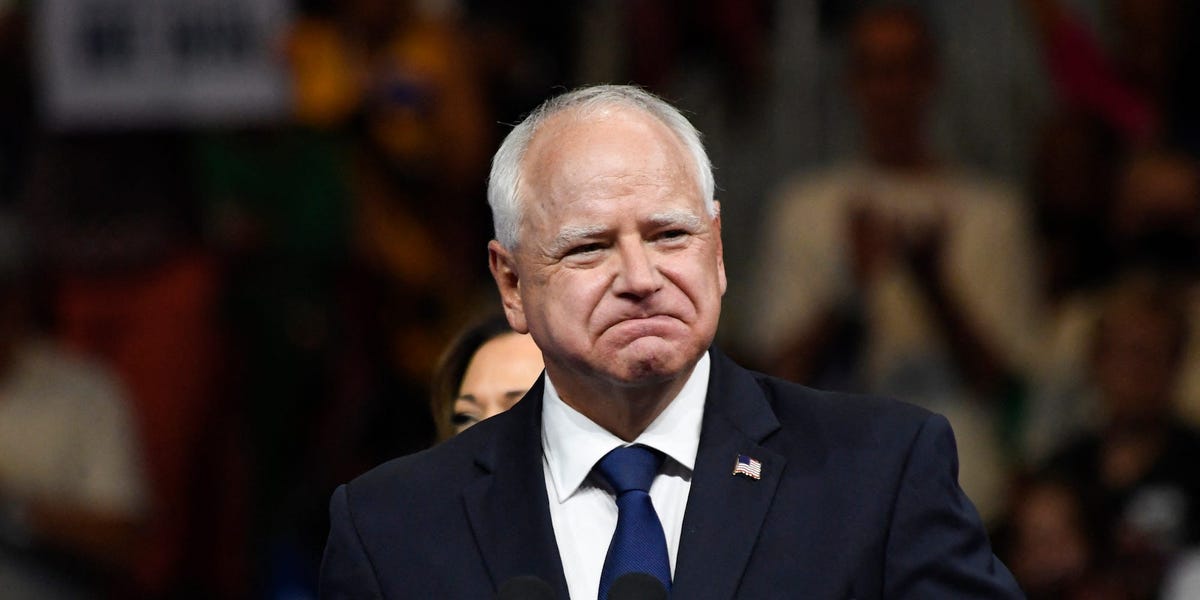- Gov. Tim Walz of Minnesota is a man of relatively modest means, according to financial disclosures.
- In fact, he doesn’t own a single stock.
- Like other members of Congress, Walz even slept in his Capitol Hill office for some time.
dude doesn’t give a fuck about the shareholders 😮 where are my pearls?
Me neither, Tim. Never have, never plan to buy any. If somehow I inherit some stock, I won’t know what to do with it.
If you have a 401k, HSA, or other common financial accounts offered by employers, you most likely have money in the stock market. Usually it’s an indexed mutual fund of some kind.
I haven’t read the article, but usually when people like this don’t have any stocks, it’s to avoid a conflict of interest, but they do potentially own something like a whole market etf that’s being managed by a 3rd party. Something like XGRO
That varies though. Some really do have nothing.
Edit: And while it seems like in this case it’s true to the intent, technically, owning an ETF share isn’t owning a stock. You don’t own the underlying stocks with ETFs
Yeah, I don’t own stocks. I just have a 401k and shares of VTI, VXUS, and VOO in my IRA and traditional brokerage. But I don’t own stocks!
To be honest though, I don’t see a problem (or at least as big of a problem) with politicians owning total market index funds.
To be honest though, I don’t see a problem (or at least as big of a problem) with politicians owning total market index funds.
Oh I totally agree with you on this. There’s no conflict of interest in that case so why not.
Honestly? That makes me really concerned about his long term wellbeing and raises a few orange flags for how he can be compromised. Owning individual stocks is very questionable. Investing heavily in a mutual fund or some other managed portfolio is common sense for anyone win a position where retirement is an option.
But also? Fuck yeah.
Things like mutual funds, IRAs, etc, are not considered securities and are not disclosed on economic interest disclosure forms. That is true for most government disclosures, including in Minnesota. Minnesota only requires disclosing directly held securities, like stocks, with a certain value. E.g., if you own $10,000 in Apple stock, that needs to be disclosed, but owning $10,000 in mutual funds shares does not.
He has multiple pensions from his different jobs.
Before America made us learn to be our own stock broker, and change jobs every 3 years for a pay raise, there were these retirement vehicles provided by employers that you worked with until you retired that you didn’t have to know anything about.
He has pensions.
Business Insider - News Source Context (Click to view Full Report)
Information for Business Insider:
MBFC: Left-Center - Credibility: High - Factual Reporting: Mostly Factual - United States of America
Wikipedia about this sourceSearch topics on Ground.News
https://www.businessinsider.com/tim-walz-kamala-harris-personal-finances-2024-8
Fake news pumping this guy as the new jesus, if the half the shit is true, then why is this guy not the presidential nominee for democrats?
Wtf is Kamala bringing to the table?
A lot more than you are contributing to Lemmy. 🤡
Experience as vice president for an incumbent president, and more name recognition across the US.
The presidential nominee needs broad support and recognition, with the VP essentially filling out political gaps. Voters are likely more comfortable with a name they know, leading to greater turnout. It also significantly reduces campaign cost to outcome ratio because the voter base doesn’t first need to be educated about who the candidate is. People have limited attention spans, and you want to focus campaign dollars on the things that will move the needle most. This particular VP pick is not well known across the US, unlike the presidential nominee shortlist before Harris was chosen where some of those contenders overlapped with the VP shortlist.
Also, less uncertainty and complexity taking over the nomination when Biden bowed out.
Literally no one is doing that.






